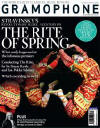Texte paru dans: / Appeared in:
*

Gramphone (03/2013)
Pour
s'abonner / Subscription information
Naïve
OP30536


Even accomplished studio versions of the opera are seldom
consistently satisfying, so there is room for Alan Curtis’s stylistic
sincerity, fidelity to the unabridged text and sensible casting. In a few
previous projects Il Complesso Barocco’s playing sounded disengaged from the
emotional ebb and flow of the drama but on this occasion it never seems
perfunctory. Judiciously paced recitatives are accompanied unobtrusively and
always permit the poetry to flow with the utmost clarity; this allows the
listener to absorb the delivery of characters’ lines. It is a refreshing
antidote to Baroque opera performances which seem obsessed with hurrying up
as much as possible in order to get to the next aria, or spice up the
continuo parts to distraction.
Curtis wisely pays diligent attention to Handel’s tempo markings: Cesare’s ‘Empio, dirò, tu sei’ has righteous anger but is not so rushed that the words are lost; the mournful ombra music in the middle of Sesto’s vengeance aria ‘Svegliatevi nel core’ is ideally spellbinding, whereas its fast sections are dogmatic enough to convey determination rather than merely superficial volatility. Tolomeo’s spiteful ‘L’empio, sleale, indegno’ is adeptly characterised by the animated strings, and Cesare’s ‘Va tacito e nascosto’ is judged astutely as a stealthy conspiratorial aside to the audience. A genuine effort bas been made to make the onstage band in the. Parnassus scene (‘V’adoro pupille’) sound from a distance and the spatial texture with the rest of the orchestra is beguiling.
There are no weak links vocally. Marie-Nicole Lemieux is a dependable Cesare and Karina Gauvin is an eloquent, steely Cleopatra. Emőke Baráth’s Sesto is ideally fresh-voiced and Romina Basso is a perfect fit for Cornelia; their unforced voices blend together exquisitely in an achingly beautiful performance of the duet ‘Son nata a lagrimar’. It also seems right that Johannes Weisser sings Achilla’s ‘Tu se il cor’ initially as an attempt to be genuinely seductive rather than to clumsily bully Cornelia from the outset. My only reservation is that in some slower arias fiddly embellishments seem convoluted where I would have liked to sense Handel’s melodic genius breathing more freely. However, Curtis’s outstanding performance ranks comfortably alongside George Petrou’s dissimilar (and occasionally quirky) version as the most satisfying studio recordings of Handel’s most famous opera.
Cliquez l'un ou l'autre
bouton pour découvrir bien d'autres critiques de CD
Click either button for many other reviews


